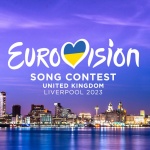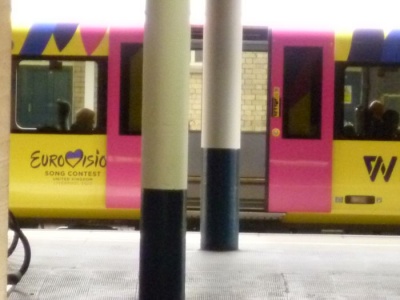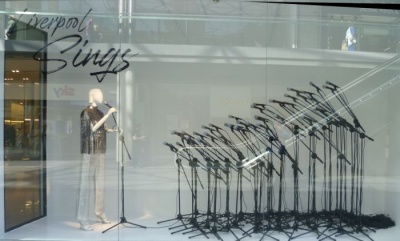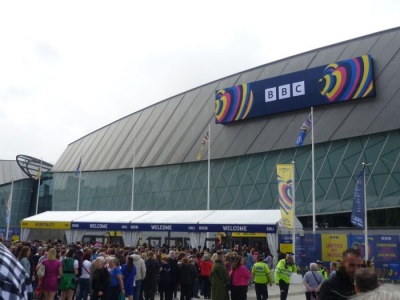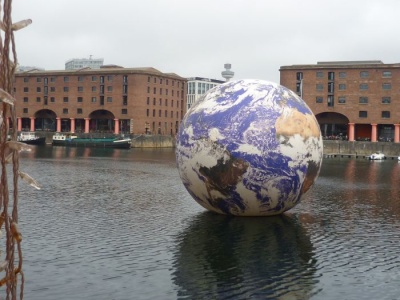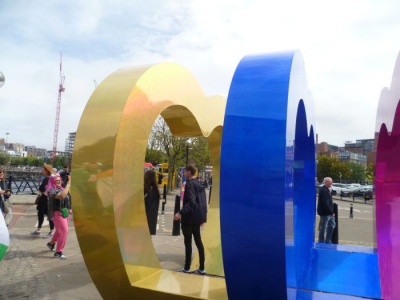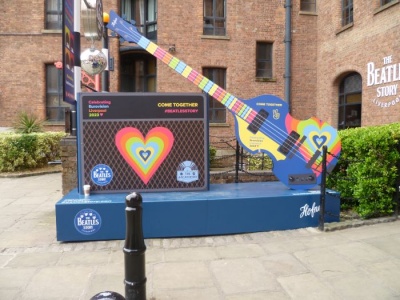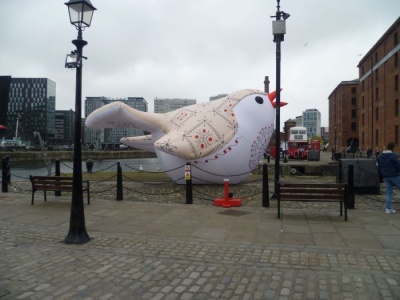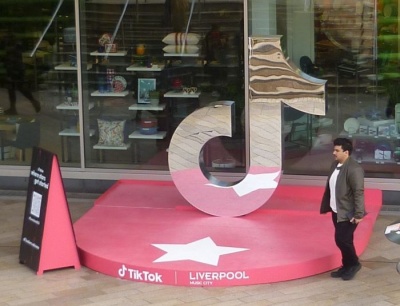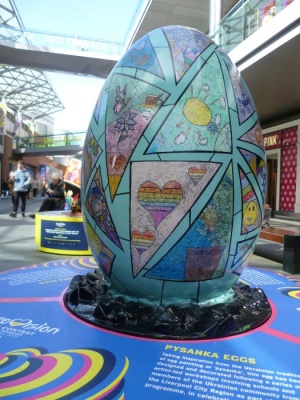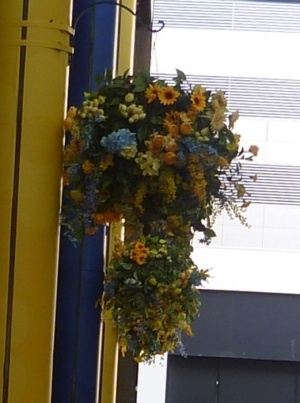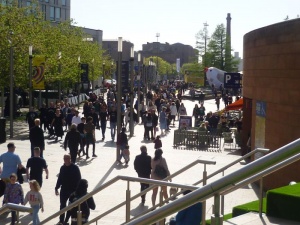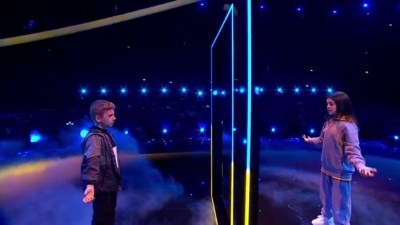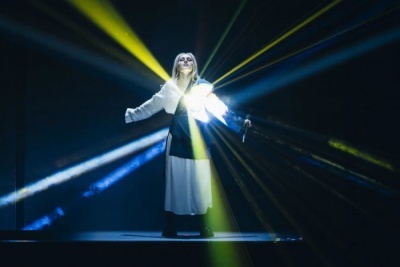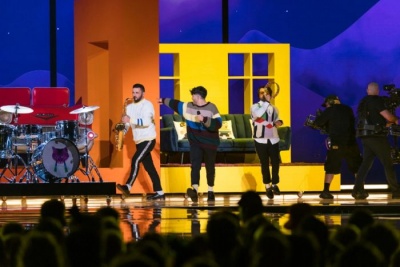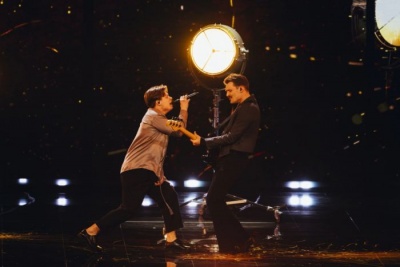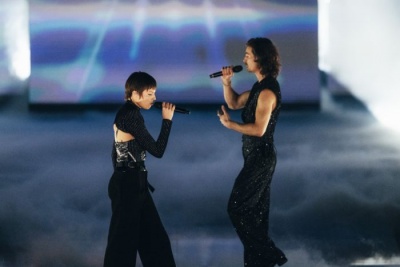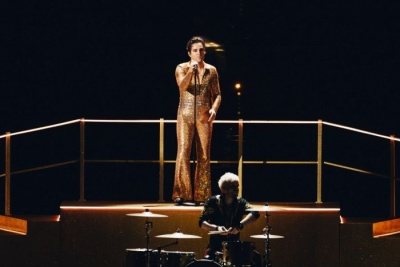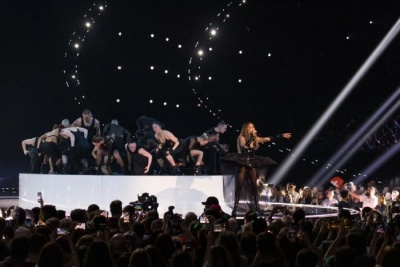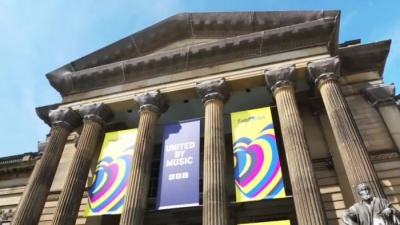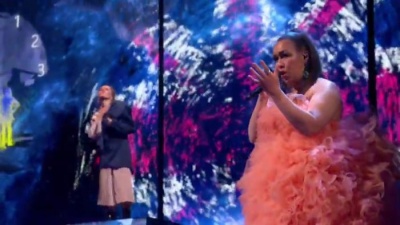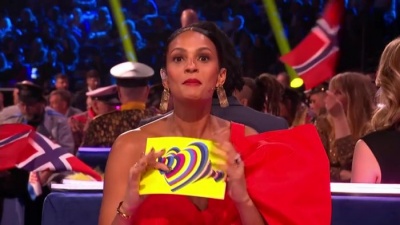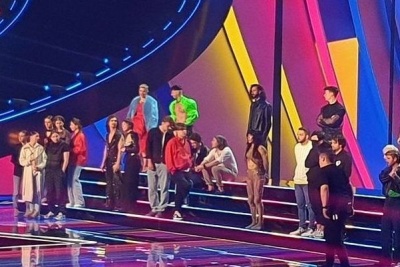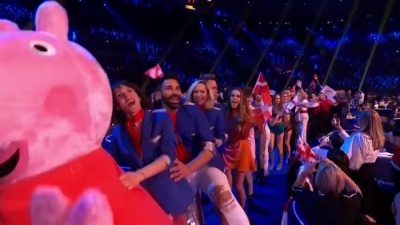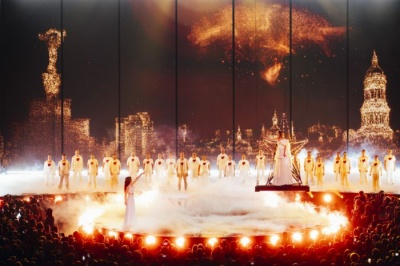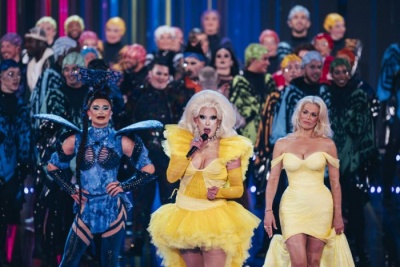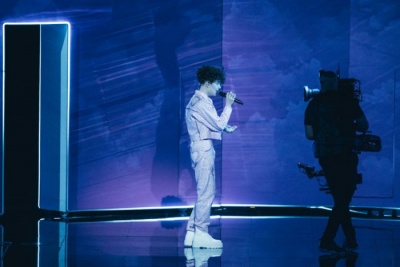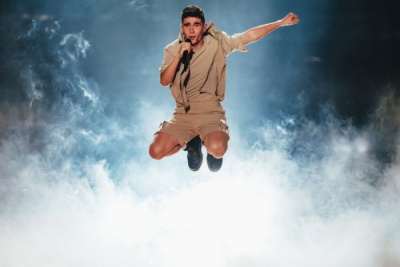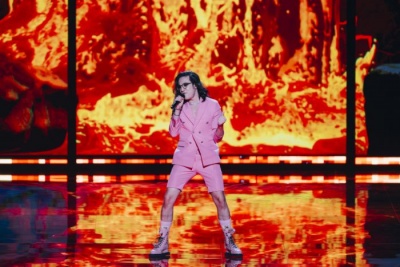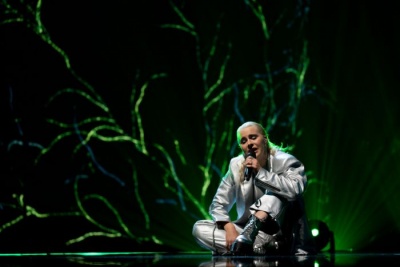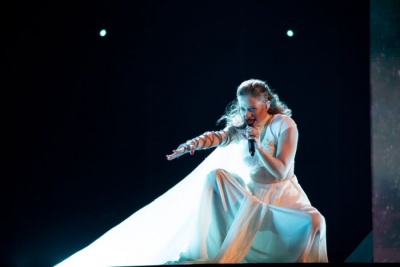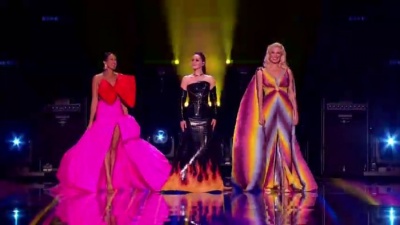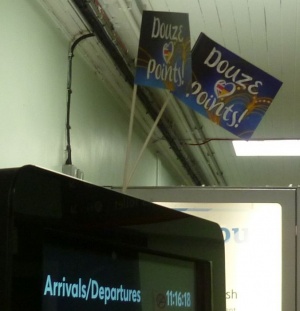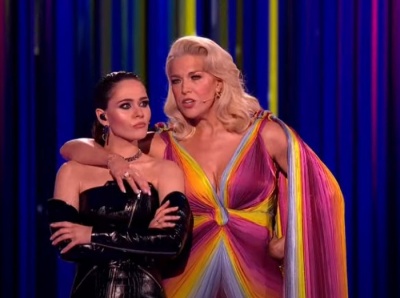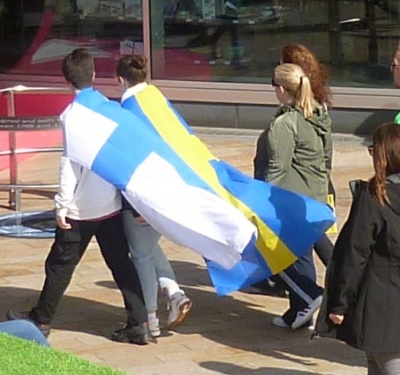Weaver's Week 2023-05-14
Last week | Weaver's Week Index | Next week
This edition was published on the morning of Saturday 13 May, before the grand final.
Every year, we can talk about what happens on screen. This year, we can do something different.
The Eurovision Song Contest is taking place in a city just down the road. Day out, anyone?
Contents |
Eurovision Song Contest field trip
Liverpool, 9 May
The Eurovision Song Contest gets everywhere. Even to the booking hall at Crewe station, where they've decorated the announcer screens with little "douze points" flags. On arrival at Lime Street, the platforms have welcoming messages underfoot, and there are real live people to talk to in the foyer. Welcome to Liverpool, there are no strangers, just friends we've recently met.
Step out from the station, and Eurovision branding is everywhere. On the shopping centre wall. On the billboards. And a giant inflatable bird just across the road. That's one of twelve songbirds dotted around the city, representing Ukranian culture and heritage. The fundamental message is reflected throughout: this is Ukraine's party, hosted in Liverpool.
National colours of blue and yellow are everywhere. Most of the shops have window displays, many have balloons over the awning or flags in the window. We were particularly impressed by one fashion store, which shares its name with one of the singers. A million microphones, all pointed at the singer.
The Em and Es Arena — sorry, sorry, BBC Arena in Liverpool — is used to handling large events. The audience of 8000 is all admitted, searched, and seated within 90 minutes.
Unfortunately for us, the Week didn't win in the Botmaster Lottery, so we wandered around the rest of the city while lucky people enjoyed the dress rehearsal.
Just by the arena is the Albert Dock, where they used to make This Morning with Richard and Judy. Although the floating weather map has gone, they've plonked a giant inflatable globe in its place.
There are photo opportunities everywhere, people can stand in concentric hearts and have friends take their photo. Or queue for a few minutes to have their pic in the "Liverpool" sign.
It's not just the stores getting in on the action, the tourist attractions are also doing so. The Beatles Story had a particularly bright display, because you can't tell the story of music in Liverpool without John, Paul, George, and Thomas the Tank Engine.
Further round, we come to the Official Fan Village. This is behind high fences and onerous security checks: while we'd like to live in a world where they're not necessary, this ain't an ideal world. The Official Fan Village is full of Official Merchandise stalls, and sells stuff from the Official Sponsors. Refreshments are sold to you by Bailey's, Official Sponsor of the Terry Wogan Memorial Drinks Interval.
We didn't go a bundle on the Official Fan Village. Perhaps it was the changeable weather, by now spitting with rain. Perhaps it was the entertainment on offer, opera singers with barely-changed versions of "Space man" and "Rise like a phoenix". Perhaps it was the high prices, and the even higher walls. Were we in a holiday camp like Maplin's, forced to have Official Fun in an Officially Sanctioned and regimented way?
Stepping past people playing piano on steps by the Liverpool Museum, we headed back into the city centre. There was an Unofficial Fan Village by one of the shopping centres, though nothing seemed to be happening when we nosed by.
Liverpool has taken Eurovision to heart. Many of the shops played classic tunes: if you want to browse books while listening to "All kinds of everything", that can be arranged. "Soldade, soldade" and "Taken by a stranger" in the coffee shop? They've put their playlist together with care. Loudspeakers in the main street played their part: boogie on down to "Hard rock hallelujah" by the clothes shop.
Other people were playing on pianos – normal, upright pianos, like on that show with Mika and Claudia – left in the city centre. Still other performers popped up on small stages provided by the Official Data Leak Partners.
Visual installations caught our eye. Pysanka eggs – giant painted eggs, twice as tall as a human – were in the shopping street. They'd been painted by local schools and refugees from the war in Ukraine.
Inevitably, Liverpool wants to get its cut of the contest. Hotel prices went through the roof, probably too high. Many pubs and bars changed their menu to serve continental dishes, and there were a range of Ukranian beers brewed in Liverpool. Most agreeable.
Official tat is expensive. Unofficial tat is also expensive, though not quite as pricey, and certainly doesn't involve queuing for half-an-hour to get into the Official Tat Store. Pubs and clubs are showing the event, though seem averse to using the Eurovision word. Is it an event where only Official Partners can call it by its given name and everyone else has to use circumlocutions? Round spherical objects to that.
At times, we wondered if Liverpool is perhaps too small for Eurovision. The city centre was crowded, there was little room to relax and switch off and get away from the pervasive contest. But if Liverpool is too small, would anywhere in Europe be big enough to cope? Or is this because the public on this island has been starved of Eurovision Song Contests since the last century?
Liverpool has embraced the Eurovision Song Contest. It's taken on the easy duty to present its best face to the world, and it's taken on the impossibly difficult duty to represent Ukraine to the world, and the people and the city have passed both tests. The main locations are all within easy walking distance, and there's a pervasive buzz that something unique is happening.
What is happening?!
Semi-final 1, BBC for EBU, 9 May
Video montage explaining the unusual circumstances. A re-enactment of the picture frame dancing from Junior Eurovision eighteen months ago. Julia Sanina from The Hardkiss leads "Let it Shine", a pyro-and-rock performance involving many local dancers. A few words from Melanie C, Liverpool's biggest pop export of July 1996.
Julia is one of the three co-hosts, joined by Hannah Waddingham (singer and actor) and Alesha Dixon (singer and talent show judge). Alesha will rap during one of the ad breaks, Hannah will take lessons on air guitar and speak very decent French.
Postcards in this year's contest use 360-degree cameras to flip between places in Ukraine or Liverpool and corresponding places in the performer's home city – first up was the central libraries in Liverpool and Oslo.
The main interval act was "Freckled Sky" – Alyosha and Rebecca Ferguson singing "Ordinary world" while a lyrical CGI dance piece takes place on the stage. Rita Ora performed with many pupils from the Liverpool School of Performing Arts, there are interviews with Timur Miroshnychenko and Dustin the Turkey (!), a guest appearance by some people who were in Bucks Fizz, and some history pieces.
So, what isn't going through?
"Dance (my own party)" by The Busker, who came from PBS ("Malta"). Consider yourselves unlucky, as this would have sailed through on Thursday. It's much more fun on stage than on video, and we particularly appreciated the costume change. And the car, it's the first time they've had a defunct old banger on stage since (insert your own joke here).
"Aijā" from Sudden Lights represented LRT ("Latvia"). This was a tribute to post-grunge, the difficult rock music from about 1995. Completely overlooked on this shore, where they preferred 1960s tribute acts. The song has energy, and focus, but it never becomes clear what he's singing about, and just when we might be getting an idea about this song, it ends.
"Tell me more" by Turalturanx for Íctimai ("Azerbaijan") Two reasons why this fell. One, it came after the sandwich made with Loreen; whoever comes after the pre-contest favourites always has a huge hill to climb. Two, it came across as a Saturday morning tv sketch circa 2000, two anonymous young people riff off Sixpence None the Richer's hit. Light and disposable, and came on a night when any excuse to ditch a song would do.
As one might expect, Spotify had electronic billboards all over Liverpool, bigging up some of the performers tonight. Curiously, a lot of them showed Turalturanx for a lot of the time. Was this Spotify showing its talent for picking a winner early doors? No.
"Burning daylight" from Mia Nicolai and Dion Cooper represented NOS via AVROTROS ("Netherlands"). We have this as the big loser from the move to 100% public vote. Was "Burning daylight" selected before the rules changed; was it too late to deselect them? We may never know. It's exactly what we'd expect from the broadcaster, heartfelt and emotional, wears its gentle desires on its sleeve. The song was perfectly written, performed with style and panache, and will have connected with the juries. But the juries don't vote, the public do, and they said "nee, passen de frikandellen".
After so many years of success, commentators in the Netherlands have not been happy. Perhaps this might encourage AVROTROS to enter something a bit different: the last ten entries to Senior Eurovision have been – more or less – slow and heart-wrenching. Might the broadcaster talk with the exciting young performers? Rappers like Typhoon and Claude, rising stars like Goldband, established names like Typhoon and The Vices, or treat us to the Krezip comeback. This year is a setback, the broadcaster remains on the right course.
"We are one" by Wild Youth, representing RTÉ ("Ireland"). "I cannot understand how this happened," said RTÉ legend Marty Whelan. Marty, old bean, here are a few hints. Your lead singer didn't sing in the chorus. The song was banal, clichéd, unimaginative. Sure it was anthemic, but it was also entirely naff.
When we get the full results on Sunday morning, we expect that RTÉ will be last. Again. It would be the third time in a row that their songs have propped up the semi-final, a sequence that quite clearly says RTÉ doesn't understand the Eurovision Song Contest as it is today. "We are one" would have floundered in any era; in 2023, it's doing the doggy paddle in a diving pool.
Whatever RTÉ is doing, it isn't working. Is it time to have a total reset, to find some way of reflecting Ireland's massive contributions to art and culture? Lean into the island's soft power, its good reputation around the world. Harness the perpetual desire to beat those eedjits next door. Maybe even consider thinking about an entry in Irish. Couldn't do worse than this.
Through to Saturday
The three Nordic favourites all went through. "Queen of kings", Alessandra channelled Game of Thrones and every tension bed on every game show ever. "Tattoo", Loreen wasn't squashed by the panini press o'doom. "Cha cha cha", Käärijä had his hulk sleeves and dancing we won't discuss.
More favourites progressed. "Mermaid", Noa Kirel has a strong Eurodisco bop with some interesting transformations near the end. "Ai coração", Mimicat presents a personal vision of fado and Portuguese identity right now via the musical "Chicago". "My sister's crown" from Vesna is sparky, hard-hitting, take-no-prisoners feminism – all wrapped in a pink package.
Two from the Balkans, which leaves us wondering how much the televote-only rule changed things. "Samo mi se spava" from Luke Black, the one with the lotus flower and video game captions. "Mama šč" from Let3, a bizarre and hence memorable conceptual piece about war.
Which left "Watergun" by Remo Forrer, a not-very-subtle song about how war is stupid, though sung brilliantly. "Soarele şi luna", we confess to being completely confused and entranced by Pasha Parfeni's song with the horn hairstyles.
Other changes this year
A strange build-up to Eurovision. Not just that the BBC has made a massive effort, though that very much helps. There's been a three-hour loop of recent songs on the Red Button for the past couple of weeks, showcasing the superlative (Nina Kralić's big dress), the forgotten (Mika Newton and the sand designer), the welcome ("Hour of the wolf"), and the overplayed ("Heroes" yet again). They didn't have room for artpop (no "Kedveshem", nothing that might pass as a Balkan ballad), or for Europe's chosen hits (neither "Snap" nor "Calm after the storm", two of the biggest Eurovision songs of the past decade). Pretty much everything came from the past fifteen years – it was all "Love love peace peace" and no mention of "Riverdance".
The message was further reinforced on Monday night, with Jason Manford's Guide to Eurovision, or "It's not how it was in Terry Wogan's day". Has the process of dewoganisation finally reached its goal, and the BBC and the public accept Eurovision for what it is? Quite possibly.
No, the really strange thing is that we'd had almost no word of what's happening inside the arena. Five years ago, press were allowed into the first rehearsals. Songs could go up in everyone's estimations – that first rehearsal lifted "Fuego" from noisy mess to potential winner. Songs could go down as well as up – a few years earlier, Trijntje Oosterhuis received snark for her choice of clothes, and her song "Walk on" moved from marginal qualifier to failure.
As has been the practice for some years, the first rehearsals were closed to the press. This year, the second rehearsals were also closed. All that was released to the public was a 40-second clip from one of the rehearsals, and plenty of still images. Early favourite "Tattoo" was losing ground, "Évidemment" and "Cha cha cha" impressed the tastemakers. "Mermaid" left people confused, there was love for "Who the hell is Edgar?", and nobody quite knew what to make of "Blood & glitter".
Press didn't get to see anything until the dress rehearsal on Monday afternoon. Nor did the journalists get any time with the performers, the three-minute conversations to clip for television and the web. It's difficult to build a buzz on press releases and interviews from public spaces. A happier compromise might be to allow delegations to close second rehearsals, but ensure everyone can talk to the media afterwards.
Duty of care: don't be a div
There were rumours that they'd change the end of the semi-finals – how we find the ten acts progressing to Saturday. All the performers would be lined up on stage, with the winners announced – and interviewed. And a final round of applause for the non-continuing contestants. It's not an idea that appeals to this column, when they do something similar on The X Factor and Strictly Come Dancing it's as the prelude to another stage, not the end of the process.
Eurovision has to change and evolve – video links to the juries, the heart symbol, televoting, a ticketed audience, even colour pictures were new once. But there are already questions about whether the producers are giving reasonable care to the contestants – some of the footage from Tel Aviv was painful and left a sour taste in the mouth. We don't think that getting folk up on stage is the solution to any actual problem. Let the contestants remain in their green room pods, let's not make more than we must out of a painful situation.
And it clashes horridly with the vibe of the production. "We're gonna protect the performers with closed rehearsals, because the rehearsals are for performers not the press." "We're gonna put a massive close-up of performers on the screen, so the viewing millions can see them blub at not qualifying while they stand isolated from their mates."
Mercifully, cooler heads prevailed, and the idea didn't come back after the Monday afternoon dress rehearsal. File this alongside "Eurovision of the Future" from the 2014 contest, which got cut down and cut down and ended up as blokes singing up ladders for no obvious reason.
Eurovision Song Contest semi final 2
BBC for EBU, 11 May
The second semi-final began with a brief review of the first semi-final. There was a cameo by Scooch, and a conga line was led by Peppa Pig – to the sound of Black Lace, the BBC's entry in 1979. "Before my time," squeaked Miss Pig. Gravity was in full effect, and many of the performers either sat or lay down on the stage.
Interval acts reflected Ukrainian life and culture, with Zlata Dziunka from last year's Junior Eurovision joined by Mariya Yaremchuk and rapper OTOY. "Music Unites Generations" was sober and sombre and sobering. Three drag queens – Miss Demeanour, Mercedes Benz, and Tomara Thomas – starred in "Be Who You Wanna Be". Eurovision is the place for everyone, we're told.
Saturday night is not the place for six songs from this semi-final. Let's give them a moment in the light.
"Breaking my heart" from Reiley represented DR ("Denmark" on screen). The gimmick was a rotating room – not like Rosa's last year, this was a simple shell of walls and an arched door that went round while Reiley jigged about on the spot. The young man always found the camera, always looked cute and adorable. The song is very contemporary, all staccato beats and high-pitched yelping. And that was its downfall – at times Reiley's vocal was barely audible over the backing track. Was this him not singing well, or was it a technical fault?
"What they say" was performed by Victor Vernicos, representing ERT 2.0 ("Greece"). If Reiley was difficult to hear, double that for Victor: either he was continually missing his notes, or the microphone sound was far too low in the mix. Sadly, we fear that Victor actually was mumbling into the mike, and we'll never know how this should have sounded. The youngest competitor was in a tan shirt and shorts combo, and ran about a lot on the stage.
"DGT (off and on)" was sung by Theodor Andrei, representing TVR ("Romania"). A Lisa Loeb lookalike sits on a stool and strums a guitar, then stands up and performs a duet with projected images of himself. The synchronisation is amazing, the song sounds like someone straining to complete their morning preparations. Even vote-rigging wouldn't get this through to Saturday.
Another of last year's vote-riggers fell. Piqued Jacks sung "Like an animal" for SMRTV ("San Marino"). Looked like a bad Freddie Mercury tribute act, performed in front of a pair of lips that evoked the Rolling Stones, and it's bland stadium rock. On Thursday night, we were seriously unimpressed; we watched the performance again on Friday, and there is something there. Not very much, and it's far too late to find it, but our opinion has gone up.
"Power" by Diljá was sent in by RÚV ("Iceland"). Drum and bass at the Eurovision? Of course someone's going to try it. This was two songs in one, starting with almost a minute of soft vocals aimed at hitting the jury notes, before breaking into the sort of anthem you'll hear on Capital Radio all the time. Great commitment to the staging, but evidently not quite enough to connect with the viewers at home.
"Echo" from Iru missed out, disappointing GPB ("Georgia"). We do not understand how this failed to qualify, it's a powerful piece of artpop, Iru wails like a banshee, channelling all sorts of curses and promises.
Iru is a former winner of Junior Eurovision, she was in girl group Candy from 2011. And questions might be asked at GPB: how come the entries are always there or thereabouts at Junior, and haven't made the final of Senior in almost a decade? This column wonders if the selection process isn't quite working, GPB have recently picked their performer through The Voice of Holland of Georgia, with the winner known at the start of February. That only leaves six weeks to find a great song for their performer – is that too little notice? Do they need to go back to internal selections, or a national final of songs?
The ten that did progress.
"Who the hell is Edgar?" from Teya & Salena, a musing on Edgar Allan Poe, his legacy, and how it's still impossible for artists to make a fair living in a capitalist economy. (It's first on tonight, so remember these nuggets, say them before this first song begins, and everyone will think you're a fountain of knowledge all night even if you talk complete cobblers the rest of the time. Works for this column...)
"Future lover" from Brunette has a ramp on stage, and they don't go over-the-top with this gimmick. "Because of you" by Gustaph is a traditional Eurobop, a touch of soul, a lot of class. Another traditional Eurobop comes from Blanka, "Solo" was already a sizable hit last year, and is very much One For The Dads.
"Bridges" from Alika is a totes emosh piano ballad in the Duncan Laurence mould, sung by a young woman with powerful stage presence and a lovely blue dress. Similar notes for "Break a broken heart" by Andrew Lambrou, a totes emosh rock ballad in the Lewis Capaldi mould, sung by a young man with powerful stage presence and a black vest. "Stay" from Monika Linkyté is a classy soulful love song that looks like it fell through a wormhole from the Charmed soundtrack.
Rock progressed. "Carpe diem" by Joker Out made it to the final, a hard-edged emo band in the style of Jimmy Eat World from two decades back. "Promise" from Voyager also made it through, as we thought it would back in March. Balkan ballads progressed, "Duje" is from Albina and Kelmendi family, and we find it impenetrable and lovely and lovely because it's impenetrable.
In other news
"Heroes" is the slogan for this year's Junior Eurovision Song Contest, to be held in Nice at the end of November. France Télévisions teased us when they suggested that this year's contest could be bigger than ever, with some debutant broadcasters.
RTL Luxembourg has been approved as an EBU member. The company – CLT-UFA to its board – will represent the Grand Duchy of Luxembourg in the various Eurovision exchanges. This will include the Eurovision Song Contest cultural exchange, which CLT-UFA won five times between 1956 and 1993.
Apropos of a thread on the Bothers' Bar Discord (which we only got to about five days later, because life). This column's back-of-an-envelope calculations in 2021 reckoned that the entire cost of funding an entry at Eurovision was somewhere around £800,000. That's everything from finding the talent, doing the set, flying the delegation out, and the participation fee to the EBU – likely half that money. In an average year, the BBC gets 7.4 million viewers for the Saturday final, another 600,000 for the semi-finals. This year's budget may be a teensy-weensy bit bigger.
Quizzy Monday continued, with the last University Challenge quarter-final. Southampton beat Newnham Cambridge by 135-120. Three buzzes decided the match. One was a penalty from Newnham, who gave "Hungary" when the question had already asked for the city "Budapest". The other two were superb buzzes:
- Q: What is the only vowel in words with the following meanings? The African primate Pan paniscus...
- Q: To which figure in Greek myth was Albert Camus referring when he wrote...
A vowel from one example. A quotation's subject without hearing any of the quote. Dom Belcher and Ethan Lyon went for it, and won it. Well done, top-notch quizzing.
"Are you trying to make me say 'tit' on Radio 4?" One-off special Birdbrain of Britain went out, with all the questions related to birds – ornithological or cultural, everything from the paridae family to "Angry Birds". Kate Humble won a high-scoring contest.
Scotland's Home of the Year has been renewed for series 6. Glasgow architect Danny Campbell joins the judging panel alongside interior designers Anna-Campbell Jones and Banjo Beale. Danny and Banjo will take over from judges Michael Angus and Kate Spiers who have left to pursue new projects. Series 5 begins on BBC1 Scotland this Monday.
The BBC's looking for two new independent game shows made in Scotland and/or Northern Ireland. Formats will need to slot into the afternoons or early Saturday evening, which rather suggests that The Tournament is not coming back.
We also hear that Outsiders is coming back to Dave, it's the one where David Mitchell invites comedians to spend a week in the woods near Epping and win badges like they're on Hey Duggee!.
As well as Scotland's Home of the Year (BBC1 Scotland, Mon), we have a The Big Fat Quiz of Everything Sport Special (C4, Sun). Channel 5's series of Challenge Anneka is scheduled to continue (Sun), but do check listings.
But before that, we have The Weakest Link Eurovision Special, we have Pointless Celebrities Eurovision Special, we have Final Score Eurovision Special, and we have Eurovision Song Contest Final 2023 Eurovision Special.
The competition running order begins with "Who the hell is Edgar?", thus ruining many jokes. Of the other favourites, "Évidemment" is in position 6, "Tattoo" in 9, and "Cha cha cha" at spot 13. "My sister's crown" follows at 14, "Promise" at 15. After "Heart of steel" at 19 come "Queen of kings" at 20, and "Blood & glitter" at 21, a loud few minutes. "Unicorn" is at song 23, and after the art-pop of "Mama šč" comes "I wrote a song", the 26th and final song.
And then it's almost two hours of voting recaps, interval acts, voting recaps during the interval acts, Martin Österdahl's latest brainfades, and the Big Wodge. Scheduled off-air time is 12 midnight local, 0100 CET.
Who wins? You might help decide.
Pictures: Outdoor pictures of Liverpool by Weaver. Show pictures credits: (CC) EBU / Corinne Cumming; (SLB) EBU / Sarah Louise Bennet (CH) EBU / Chloe Hashemi (tv) EBU / BBC as broadcast; (ESC_news) @esc_news@instagram.com
To have Weaver's Week emailed to you on publication day, receive our exclusive TV roundup of the game shows in the week ahead, and chat to other ukgameshows.com readers, sign up to our Google Group.

